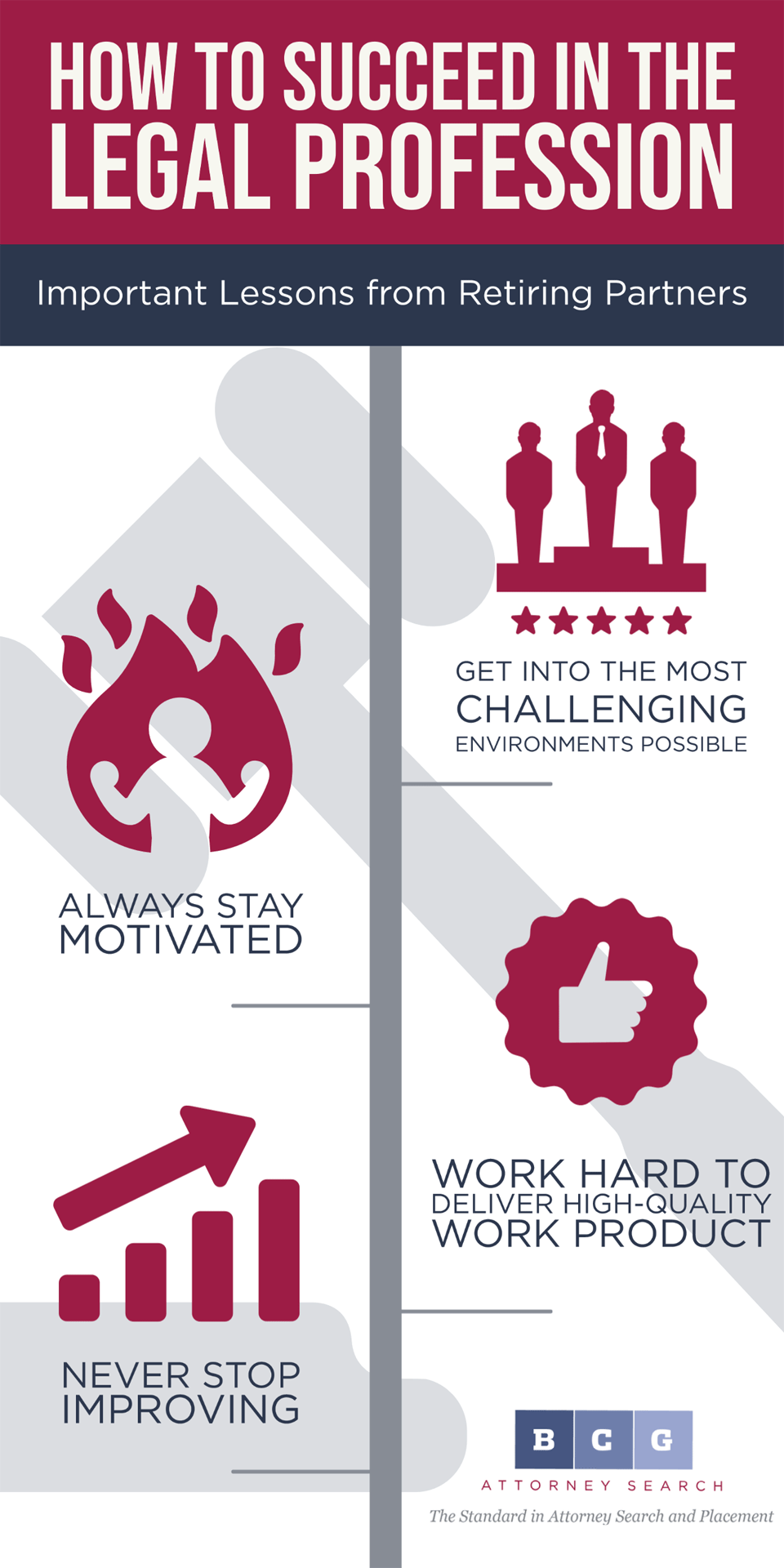
Every few weeks I receive a telephone call from a partner in a major law firm who is being forced to retire because the firm has age limitations for partners. These partners generally want to go to a new firm. Instead of wanting to retire, most of these partners actually want more work, more challenges and so forth. Last week, to my astonishment, I received a call from a litigator in his late 70’s who was not being forced to retire, but whose firm was no longer letting him do trials. He told me that he suspected the firm was not giving him any trials because of his age and he wanted to go to a new firm that would challenge him more!

|
|
|
There are two main reasons a law firm will hire an attorney seeking to make a lateral move. One reason is that the attorney is relocating to an area of the country where he or she is from and seeks to return and settle in that region. These sorts of lateral moves never raise questions about the attorney's motivation, commitment and potential performance. The other reason is that the attorney is not being sufficiently challenged at the attorney’s current firm, has outgrown that firm and has talents that are not being utilized at that firm. The more an attorney appears to be outgrowing his or her current environment and seeking new challenges, the more a new law firm is going to be interested in hiring that attorney.

People often wonder what makes certain law schools better than others. They also wonder what makes certain law firms and organizations better than others and why law firms located in the largest cities typically do the most high profile work.
The reality is that most law schools are teaching the same things and most law firms are also doing the same things – just doing so in a more or less sophisticated and influential way. Nevertheless, everyone knows that certain schools and certain firms are better than others. Why? Why is one school or firm better than others when they are all doing essentially the same things? Why is one attorney better than another?
Explore more about partner retirement structures and tax implications in Law Firm Partner Benefits & Retirement: 401k, Profit Sharing & Tax Implications 2024.
The answer, as I discuss in this article, is because some law schools and some law firms attract more motivated and more competitive people than others. This elevates the quality of the work of everyone in the environment. Retiring partners at major law firms have only achieved their high levels of success by having consistently had more game than most everyone else. Thus the most important lesson a young attorney can learn from these high achievers is that if the young attorney wants to be as successful as a retiring partner that young attorney better increase his or her level of motivation and competition and play to win harder and for longer and in the most challenging environments possible. For those evaluating their own next chapter, The Ultimate Guide to Retirement Plans for Lawyers offers actionable planning advice.
Consider a few facts:
- For most of my career I have watched countless attorneys start their own small law firms and solo practices. These little law firms generally do not work out—in fact they generally always do not work out.
- Large law firms composed primarily of attorneys from top law schools typically do better work than smaller law firms composed of attorneys who did not go to top law schools. This is widely known, of course, but I have witnessed this in my legal career over and over again—as a clerk to a judge and then as a practicing attorney.
These facts are not new or novel. They are well known in the legal profession.
When students go to top law schools, they are putting themselves in competition with others in top law schools who had to compete hard to get there and have similar high levels of motivation. When attorneys go to top law firms, they are doing the same thing—putting themselves into competition with others who had to compete very hard to get there and are all similarly highly motivated.
This sort of competition among motivated people has its price and it has its rewards. What happens to an attorney who goes to a very good law firm in a city like New York is that the attorney must compete with other extremely competitive attorneys where the stakes are high and there is little tolerance for mediocrity, mistakes or a laissez-faire attitude towards work. Expectations are incredibly demanding and advancement is extremely difficult. Becoming a partner at one of these firms truly means something and is a badge of honor that shows the attorney has been able to overcome all sorts of obstacles to get there.
First, these attorneys must have produced very high quality work product. Second, they likely must have generated business or developed very strong client relationships. If they had not done these things, they simply would not have stayed in the game for so long and gotten so far. In contrast, it is not expected that attorneys practicing in less demanding settings (such as smaller firms in smaller cities) would have had to face similar pressures and requirements to get where they are and thus probably do not have the same high level of game as the partners in the major firms in the major cities.
But a good portion of attorneys who go to law school and land big firm jobs do not make partner. They decide that the price of excellence is too high and start looking for less demanding alternatives. These alternatives include things like going in-house, working for the government, or starting an entirely new profession.
Most attorneys who opt for this route, of course, will refer to the fact that they once attended a top law school, or worked in a top law firm. However, this is largely meaningless when it comes to judging the attorney’s ability as an attorney. The attorney is much, much more likely than not to be nowhere near as good of an attorney as other attorneys of their year still practicing in large, prestigious law firms. Getting into law school and spending some time in a large law firm is no different than meeting the height and weight requirements for the Marines, going to basic training and then deciding not to be a Marine after all.
But for some reason many attorneys seem to believe that what they did in the past matters in terms of indicating their abilities as attorneys. It does—but not a whole lot. What matters is the quality of the people with whom they associate on a daily basis. The better the colleagues, the more competitive the environment. It is this sense of competition with others and the willingness to compete with other equally talented lawyers that makes the entire ship sail.
These seemingly harsh words and judgments serve a purpose because they are all about what attorneys need to do when they are looking for jobs. Law firms and attorneys making hiring decisions respect attorneys who want to play the game at a high level. In fact, the law school an attorney went to or the grades he or she received there cease to be all that important after an attorney has been out of law school for a few years. At this point, law firms become more interested in what sort of work an attorney is doing, an attorney’s desire to do work at a high level, and an attorney’s ability to motivate those around him or her. The system works best when the players are motivated and want everything possible from their careers.
Every year, it is articles about partner compensation that attract the most attention. The money that attorneys are paid in the largest law firms is very important—not because of the fun things attorneys can buy with the money, but because that money is a yardstick that makes everyone more competitive with everyone else. From law students trying to get jobs in the highest paying firms to partners wanting to be at the firms with the most money, everyone in the legal system is watching these figures because they establish the pecking order and they are the way in which prestige is measured. Partner compensation drives the competition among attorneys and firms that makes the system work.
Fierce competition for jobs, advancement and money are crucial for law firms to be as effective as they can be. This competition drives attorneys to work harder, to be more detail oriented, to better impress clients with legal skills, to fight harder to bring in business, to fight harder with clients to pay bills and to fight harder to get clients to pay as much as possible. In fact, at every step, the system is built to do three things. Squeeze the (1) most amount of (2) highest quality work for the (3) most money possible. In response, attorneys say things like the following:
- “The billing rates of the firm are too high to bring in clients, it is impossible.”
- “The hours are too much and inhumane.”
- “I want a life outside of work.”
- “No one here ever makes partner.”
- “My clients will not pay the firm’s billing rates.”
- “Unless I bring in a company like Toyota as a client, it is not going to matter to the firm.”
These are all statements about the system and the demands the system places upon people working inside of law firms. These things are all “standards”, and these high standards are what make law firms what they are and generate the best possible work product. Good law firms are good law firms because what is acceptable in lesser firms simply would not work there.
When attorneys talk about finding boutique law firms and doing other sorts of work, they are generally saying that they do not want to be held accountable to the competitive group they are in. The group and its standards and the competition has become too much for them. There is nothing wrong with this, and this is fine for some attorneys, but the reality is an attorney’s skills begin to deteriorate as soon as that attorney stops surrounding him or herself with the most competitive and motivated people. This means that the attorney will not be as good of an attorney as he or she was before. The best law firms are the best because of the competition that occurs among the people who work there.
When you try to get into law school you try to get into the best law school you can—not because of a certain professor or because the school has a great campus. You try to get into the best law school you can because of the sorts of people you will be competing with at the school. The students at the best schools will be the most motivated ones. When you are surrounded by the best, then your game is likely to improve as well. When you go to the best law firm you can, you do so because you are trying to play with people whose game will make yours increase as well. That is why, generally speaking, there is so much competition to get into the best law schools and best law firms. People want to work with and be around others who will help their games improve. You become better at what you do when you play around the best people.
The best law firms hire people who are interested in continually raising their game. They want the best people and they want the people who are trying to play the game at its highest level. The kinds of lateral attorneys law firms are most interested in are the attorneys who may have started out in smaller or less prestigious law firms and now are doing everything they can to work in the most prestigious law firms. These “rising” attorneys are hungry and motivated to succeed and play at a high level. These sorts of people will often do very well in their job searches due to their skills, drive and fortitude.
Regarding the partners from major law firms I mentioned earlier who are upset they are being forced to retire: These people are partners in major law firms precisely because they have the drive and motivation to work as hard as they can and want to be surrounded by other competitive people. The competitive spirit and the need to be around others who raise their game is what made them have successful careers and last so long in the profession. You simply cannot be the best attorney you are capable of being if you are not constantly driven to work with the best people, in the most competitive environments. These environments—like the Marines—are not for everyone, but they produce the best attorneys, who work on the most important matters, for the most important clients, for the most money. For partners planning their retirement or evaluating benefit packages, see Law Firm Partner Benefits & Retirement to understand how 401(k), profit sharing, and tax implications affect long-term outcomes.
About Harrison Barnes
No legal recruiter in the United States has placed more attorneys at top law firms across every practice area than Harrison Barnes. His unmatched expertise, industry connections, and proven placement strategies have made him the most influential legal career advisor for attorneys seeking success in Big Law, elite boutiques, mid-sized firms, small firms, firms in the largest and smallest markets, and in over 350 separate practice areas.
A Reach Unlike Any Other Legal Recruiter
Most legal recruiters focus only on placing attorneys in large markets or specific practice areas, but Harrison places attorneys at all levels, in all practice areas, and in all locations-from the most prestigious firms in New York, Los Angeles, and Washington, D.C., to small and mid-sized firms in rural markets. Every week, he successfully places attorneys not only in high-demand practice areas like corporate and litigation but also in niche and less commonly recruited areas such as:
- Immigration Law
- Workers Compensation
- Insurance
- Family Law
- Trust and Estate
- Municipal law
- And many more...
This breadth of placements is unheard of in the legal recruiting industry and is a testament to his extraordinary ability to connect attorneys with the right firms, regardless of market size or practice area.
Proven Success at All Levels
With over 25 years of experience, Harrison has successfully placed attorneys at over 1,000 law firms, including:
- Top Am Law 100 firms such including Sullivan and Cromwell, and almost every AmLaw 100 and AmLaw 200 law firm.
- Elite boutique firms with specialized practices
- Mid-sized firms looking to expand their practice areas
- Growing firms in small and rural markets
He has also placed hundreds of law firm partners and has worked on firm and practice area mergers, helping law firms strategically grow their teams.
Unmatched Commitment to Attorney Success - The Story of BCG Attorney Search
Harrison Barnes is not just the most effective legal recruiter in the country, he is also the founder of BCG Attorney Search, a recruiting powerhouse that has helped thousands of attorneys transform their careers. His vision for BCG goes beyond just job placement; it is built on a mission to provide attorneys with opportunities they would never have access to otherwise. Unlike traditional recruiting firms, BCG Attorney Search operates as a career partner, not just a placement service. The firm's unparalleled resources, including a team of over 150 employees, enable it to offer customized job searches, direct outreach to firms, and market intelligence that no other legal recruiting service provides. Attorneys working with Harrison and BCG gain access to hidden opportunities, real-time insights on firm hiring trends, and guidance from a team that truly understands the legal market. You can read more about how BCG Attorney Search revolutionizes legal recruiting here: The Story of BCG Attorney Search and What We Do for You.
The Most Trusted Career Advisor for Attorneys
Harrison's legal career insights are the most widely followed in the profession.
- His articles on BCG Search alone are read by over 150,000 attorneys per month, making his guidance the most sought-after in the legal field. Read his latest insights here.
- He has conducted hundreds of hours of career development webinars, available here: Harrison Barnes Webinar Replays.
- His placement success is unmatched-see examples here: Harrison Barnes' Attorney Placements.
- He has created numerous comprehensive career development courses, including BigLaw Breakthrough, designed to help attorneys land positions at elite law firms.
Submit Your Resume to Work with Harrison Barnes
If you are serious about advancing your legal career and want access to the most sought-after law firm opportunities, Harrison Barnes is the most powerful recruiter to have on your side.
Submit your resume today to start working with him: Submit Resume Here
With an unmatched track record of success, a vast team of over 150 dedicated employees, and a reach into every market and practice area, Harrison Barnes is the recruiter who makes career transformations happen and has the talent and resources behind him to make this happen.
A Relentless Commitment to Attorney Success
Unlike most recruiters who work with only a narrow subset of attorneys, Harrison Barnes works with lawyers at all stages of their careers, from junior associates to senior partners, in every practice area imaginable. His placements are not limited to only those with "elite" credentials-he has helped thousands of attorneys, including those who thought it was impossible to move firms, find their next great opportunity.
Harrison's work is backed by a team of over 150 professionals who work around the clock to uncover hidden job opportunities at law firms across the country. His team:
- Finds and creates job openings that aren't publicly listed, giving attorneys access to exclusive opportunities.
- Works closely with candidates to ensure their resumes and applications stand out.
- Provides ongoing guidance and career coaching to help attorneys navigate interviews, negotiations, and transitions successfully.
This level of dedicated support is unmatched in the legal recruiting industry.
A Legal Recruiter Who Changes Lives
Harrison believes that every attorney-no matter their background, law school, or previous experience-has the potential to find success in the right law firm environment. Many attorneys come to him feeling stuck in their careers, underpaid, or unsure of their next steps. Through his unique ability to identify the right opportunities, he helps attorneys transform their careers in ways they never thought possible.
He has worked with:
- Attorneys making below-market salaries who went on to double or triple their earnings at new firms.
- Senior attorneys who believed they were "too experienced" to make a move and found better roles with firms eager for their expertise.
- Attorneys in small or remote markets who assumed they had no options-only to be placed at strong firms they never knew existed.
- Partners looking for a better platform or more autonomy who successfully transitioned to firms where they could grow their practice.
For attorneys who think their options are limited, Harrison Barnes has proven time and time again that opportunities exist-often in places they never expected.
Submit Your Resume Today - Start Your Career Transformation
If you want to explore new career opportunities, Harrison Barnes and BCG Attorney Search are your best resources. Whether you are looking for a BigLaw position, a boutique firm, or a move to a better work environment, Harrison's expertise will help you take control of your future.
Submit Your Resume Here to get started with Harrison Barnes today.
Harrison's reach, experience, and proven results make him the best legal recruiter in the industry. Don't settle for an average recruiter-work with the one who has changed the careers of thousands of attorneys and can do the same for you.
About BCG Attorney Search
BCG Attorney Search matches attorneys and law firms with unparalleled expertise and drive, while achieving results. Known globally for its success in locating and placing attorneys in law firms of all sizes, BCG Attorney Search has placed thousands of attorneys in law firms in thousands of different law firms around the country. Unlike other legal placement firms, BCG Attorney Search brings massive resources of over 150 employees to its placement efforts locating positions and opportunities its competitors simply cannot. Every legal recruiter at BCG Attorney Search is a former successful attorney who attended a top law school, worked in top law firms and brought massive drive and commitment to their work. BCG Attorney Search legal recruiters take your legal career seriously and understand attorneys. For more information, please visit www.BCGSearch.com.
Harrison Barnes does a weekly free webinar with live Q&A for attorneys and law students each Wednesday at 10:00 am PST. You can attend anonymously and ask questions about your career, this article, or any other legal career-related topics. You can sign up for the weekly webinar here: Register on Zoom
Harrison also does a weekly free webinar with live Q&A for law firms, companies, and others who hire attorneys each Wednesday at 10:00 am PST. You can sign up for the weekly webinar here: Register on Zoom
You can browse a list of past webinars here: Webinar Replays
You can also listen to Harrison Barnes Podcasts here: Attorney Career Advice Podcasts
You can also read Harrison Barnes' articles and books here: Harrison's Perspectives
Harrison Barnes is the legal profession's mentor and may be the only person in your legal career who will tell you why you are not reaching your full potential and what you really need to do to grow as an attorney--regardless of how much it hurts. If you prefer truth to stagnation, growth to comfort, and actionable ideas instead of fluffy concepts, you and Harrison will get along just fine. If, however, you want to stay where you are, talk about your past successes, and feel comfortable, Harrison is not for you.
Truly great mentors are like parents, doctors, therapists, spiritual figures, and others because in order to help you they need to expose you to pain and expose your weaknesses. But suppose you act on the advice and pain created by a mentor. In that case, you will become better: a better attorney, better employees, a better boss, know where you are going, and appreciate where you have been--you will hopefully also become a happier and better person. As you learn from Harrison, he hopes he will become your mentor.
To read more career and life advice articles visit Harrison's personal blog.






